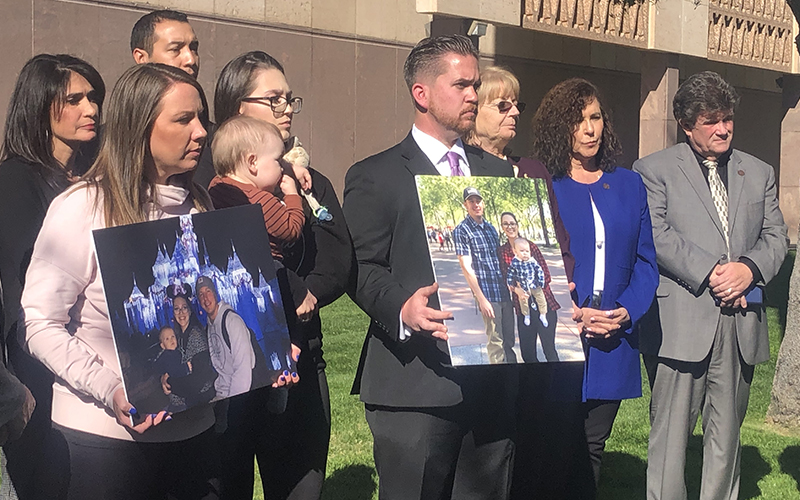
Friends and relatives of police Officer Clayton Townsend, who died this month when he was struck by a driver who was thought to be texting at the time, hold photos of Townsend, his wife and young son at a news conference Thursday at the Capitol. (Photo by Julio Lugo/Cronkite News)
PHOENIX – Supporters of “hands-free” driving hope this legislative session will finally lead to a statewide ban on distracted driving, with a Republican-led bill perhaps gaining momentum after the recent death of a police officer.
Sen. Kate Brophy McGee, R-central Phoenix, introduced the proposal at a news conference Thursday, standing with the family of Salt River police Officer Clayton Townsend, who died at a traffic stop in early January after he was struck by a driver who allegedly was texting.
Previous moves to enact a statewide texting ban over the past decade have failed to make it into law, although 21 Arizona municipalities have rules on the use of cellphones while driving, McGee said.
SB 1165 bill would go further than a texting ban: It would outlaw drivers using a phone in a moving vehicle at all, even hands-free. Motorists would be cited and face a $50 fine for a first offense; the fine would be higher for second offenses or for use that resulted in an accident.
Townsend’s father-in-law, Pete Johnson, said it was time for distracted driving law, saying Townsend’s death was the second time his family has been affected by a distracted driver. He said his sister and her husband were in a car accident in 2017, hit by a driver who was texting and ran a red light.
“On Jan. 8, Clayton paid the ultimate price,” Johnson said. “We have to stop. This is the time. Enough is enough.”
– Video by Imani Stephens/Cronkite News
Former state Sen. Steve Farley, a Democrat, pushed for regulations on the use of cellphones while driving for more than a decade. McGee’s bill, which has bipartisan support in the Senate from Republican Karen Fann and Democrat Lisa Otondo, is the 12th attempt at a state distracted-driving law.
McGee said the shift in legislative support could lead to a new law.
“We’ve had a change of leadership in the house and the senate,” she said in an interview after a news conference at the Capitol. “On my bill, the president of the Senate and the speaker of the House have both signed on. We may have a legislative mix where this is possible.
“This is not a ‘I gotcha’ for Arizona voters. This is a message saying we must change our behavior. People are dying because we’re doing these things. This is not safe behavior, it needs to stop.”
Oro Valley Police Chief Daniel Sharp said his city, north of Tucson, has a “hands-free” ordinance and officers will stop motorists holding a phone.
“It’s basically that you can’t have the device in your hand,” he said. “If an officer sees somebody with a phone in their hand, whether they’re holding it to their ear and talking, or holding it to their face, or if they’re typing on the keyboard,” they are stopped. “That’s all that it takes.”
Sharp, in an interview, said the distracted-driving bill aims to change behavior rather than punish drivers with fines: the point is to make roads safer. He said crashes have been reduced in Oro Valley because of its ban.
Brendan Lyons, a former Arizona firefighter who was cycling in 2013 when he was struck from behind by a driver looking at his phone, has been battling for an Arizona distracted driver law for years.
He hopes this year will be different.
“This has been a buildup of momentum through the last several years, more attention being drawn to this and more stories of people getting killed,” he said, pausing to measure his words. “You meet the family of Officer Townsend and – I don’t know, I’m at a loss for words.”
Follow us on Instagram.